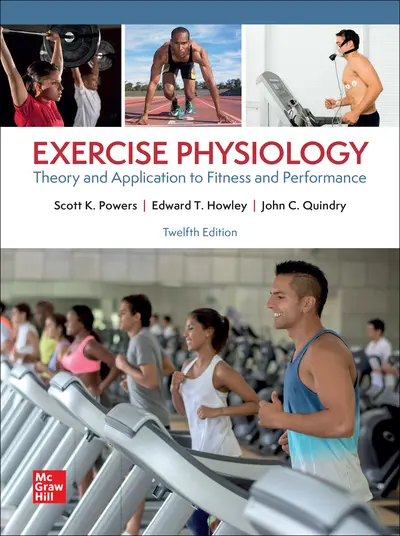My Account Details

ISBN10: 1264529813 | ISBN13: 9781264529810

* The estimated amount of time this product will be on the market is based on a number of factors, including faculty input to instructional design and the prior revision cycle and updates to academic research-which typically results in a revision cycle ranging from every two to four years for this product. Pricing subject to change at any time.
Instructor Information
Quick Actions (Only for Validated Instructor Accounts):
Exercise Physiology: Theory and Application to Fitness and Performance is designed for students interested in exercise physiology, clinical exercise physiology, human performance, kinesiology/exercise science, physical therapy, and physical education. The text clearly presents the latest understanding of the physiology of exercise through a review of the research and the use of numerous clinical applications. This comprehensive text offers instructors the freedom to select the material that is most important for their courses. The twelfth edition has undergone major revisions with the addition of Dr. John Quindry to the author team, including adding three brand-new chapters focusing on “Exercise is Medicine.”
SECTION 1 Physiology of Exercise
Chapter 0 Introduction to Physiology of Exercise
Chapter 1 Common Measurements in Exercise Physiology
Chapter 2 Control of the Internal Environment
Chapter 3 Bioenergetics
Chapter 4 Exercise Metabolism
Chapter 5 Cell Signaling and the Hormonal Responses to Exercise
Chapter 6 Exercise and the Immune System
Chapter 7 The Nervous System: Structure and Control of Movement
Chapter 8 Skeletal Muscle: Structure and Function
Chapter 9 Circulatory Responses to Exercise
Chapter 10 Respiration during Exercise
Chapter 11 Acid-Base Balance during Exercise
Chapter 12 Temperature Regulation
Chapter 13 The Physiology of Training: Effects of Aerobic and Anaerobic Training
Chapter 14 The Physiology of Resistance Training
SECTION 2 Physiology of Health and Fitness
Chapter 15 Exercise Is Medicine—Part 1: Prevention of Chronic Diseases
Chapter 16 Exercise is Medicine—Part 2: Therapy for Chronic Diseases and Prevention of Age-related Physiological Dysfunction
Chapter 17 Exercise is Medicine—Part3: Exercise Prescriptions for Health and Fitness
Chapter 18 Nutrition, Body Composition, and Weight Management
SECTION 3 Physiology of Performance
Chapter 19 Factors Affecting Performance
Chapter 20 Training for Performance
Chapter 21 Training for the Female Athlete, Children, Special Populations, and the Masters Athlete
Chapter 22 Nutrition, Body Composition, and Performance
Chapter 23 Exercise and the Environment
Chapter 24 Ergogenic Aids
Appendices
Appendix A: Calculation of Oxygen Uptake and Carbon Dioxide Production
Appendix B: Dietary Reference Intakes: Estimated Energy Requirements
Appendix C: Dietary Reference Intakes: Vitamins
Appendix D: Dietary Reference Intakes: Minerals and Elements
Appendix E: Percent Fat Estimate for Men: Sum of Triceps, Chest, and Subscapula Skinfolds
Appendix F: Percent Fat Estimate for Women: Sum of Triceps, Abdomen, and Suprailium Skinfolds
Appendix G: MET Equivalents for Exercise, Activities of Daily Loving, and Household Chores
Glossary
Index
Accessibility
Creating accessible products is a priority for McGraw Hill. We make accessibility and adhering to WCAG AA guidelines a part of our day-to-day development efforts and product roadmaps.
For more information, visit our accessibility page, or contact us at accessibility@mheducation.com
Affordability
Reduce course material costs for your students while still providing full access to everything they need to be successful. It isn't too good to be true - it's Inclusive Access.
Need support? We're here to help - Get real-world support and resources every step of the way.